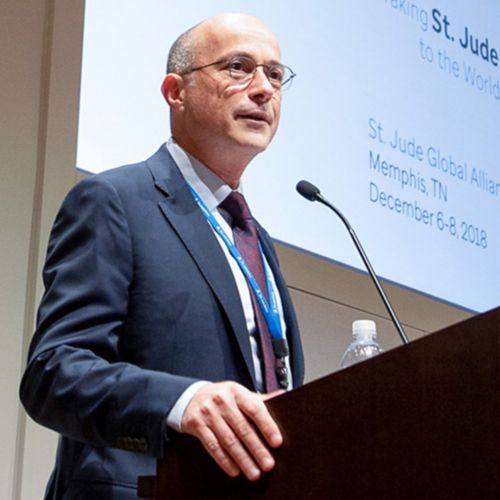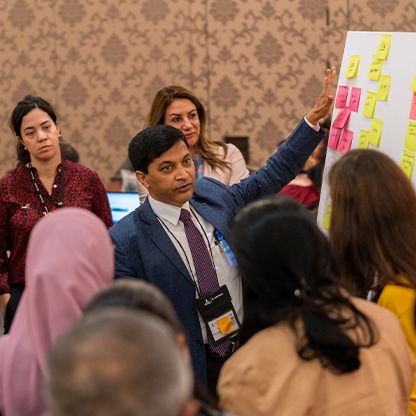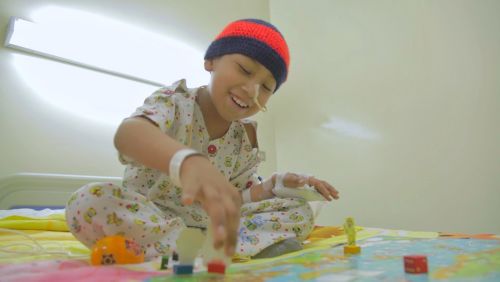St. Jude Family of Websites
Explore our cutting edge research, world-class patient care, career opportunities and more.
St. Jude Children's Research Hospital Home

- Fundraising
St. Jude Family of Websites
Explore our cutting edge research, world-class patient care, career opportunities and more.
St. Jude Children's Research Hospital Home

- Fundraising
Asia Pacific Regional Program
Other Regional Programs:
The St. Jude Global Asia Pacific Regional Program encompasses an area of the world that shoulders nearly half of the known global burden of childhood cancer.
Building on a foundation laid in 2006 when St. Jude began partnerships in the Philippines and Singapore, the Asia Pacific Regional Program has expanded to include more than 55 institutions across 13 countries. The program also draws from expert contributions from more than nine additional countries.
The regional network’s clinical, educational and collaboration platforms facilitate the exchange of evidence-based resources to support quality patient care. Smaller theme-based groups advance projects and facilitate the dissemination and implementation of on-the-ground improvement efforts. Supported programs and projects empower local teams and enable strategies to be tested for feasibility and scalability. This work demonstrates how dedicated efforts and investments in pediatric hematology and oncology can make sustainable advancements.
Regional Initiatives
Asia Pacific Regional Program initiatives include:
- Conducting national strategic mapping and assessments, with regional case studies on critical gaps (such as shortages in essential medicines) to facilitate solutions and help develop and implement national cancer control plans and programs that include children and adolescents.
- Developing context-specific strategies to cultivate and sustain a multidisciplinary workforce and foster recognition of core competencies that include local and cross-regional training programs.
- Cultivating extended virtual communities with projects that address specialized needs across disciplines and diagnoses, such as pathology and retinoblastoma.
- Capacity building for quality improvement and implementation research, including addressing local critical causes of treatment failure, such as abandonment.
Regional Engagements
Philippines
A 2006 partnership with Southern Philippines Medical Center in Davao supported the expansion of facilities for children with cancer from four beds shared with other services to a 25-bed children’s cancer and blood diseases unit in 2011. This partnership demonstrated the value of dedicated pediatric oncology care providers, including trained nurses. Collaborative efforts supported locally have since led to a new Children’s Cancer Institute, established in 2016, with a full complement of multidisciplinary staff dedicated to the care of children with cancer. An active regional network has been created on the island of Mindanao to facilitate timely diagnosis and referrals.
More recently, St. Jude Global has partnered with the University of the Philippines – Philippine General Hospital in Manila. Initiatives have included formalizing embedded roles for pediatric oncology nursing education and palliative care; establishing quality improvement processes for blood bank safety, pathology, infection prevention and care; developing a regional referral model for retinoblastoma care; and performing analyses to address preventable treatment failure.
Building on these and other relationships, in August 2017, St. Jude co-hosted the Philippines’ first National Childhood Cancer Control Workshop with the national Pediatric Oncology Society and the Philippines Department of Health. Diverse stakeholders throughout the country met for two days to define the situation and opportunities for childhood cancer care and to establish a national collaborative action plan considering needs across the health system.
Myanmar
The number of children diagnosed each year with cancer in Myanmar has increased by more than 50% since 2013. With approximately 2,000 new cases of childhood cancer anticipated in Myanmar each year, only two primary hospitals have dedicated units for children with cancer: Yangon Children’s Hospital and Mandalay Children’s Hospital. St. Jude Global, along with other regional and international organizations, has supported local leaders and the Myanmar Ministry of Health and Sports to establish a national program to strengthen childhood cancer capacity.
Since 2016, at the invitation of World Health Organization (WHO) and local leaders, St. Jude has helped coordinate a global collaboration of stakeholders in Myanmar, including government, civil society, academic and hospital leaders, and international partners. This collaboration has included co-organization of the first and second national workshops on Myanmar’s national childhood cancer control program that were held in 2016 and 2019, respectively.
St. Jude Global has supported the creation, mapping and structured collaborative assessments of the first organized national referral network for children with cancer. Formally approved by the Ministry of Health and Sports, this network includes the two units dedicated to cancer care along with 17 divisional and state hospitals and three other sites. To guide progress, St. Jude Global meets regularly with local and international stakeholders, including hospital leaders, the Ministry of Health and Sports, and WHO partners.
Cambodia
St. Jude Global works closely with leaders in Cambodia. Collaborative efforts to date have included co-hosting a national childhood cancer stakeholder meeting in March 2018, enabling additional specialty training for the first pediatric radiation oncologist in the country, and continuing technical support for the National Cancer Center to develop a pediatric oncology nurse educator program. St. Jude Global also has led stakeholder mapping and strategic planning to improve childhood cancer care with partners in Sri Lanka and Indonesia.
Singapore
St. Jude Global is partnering with key institutions in Singapore, including the VIVA Foundation, the National University Health System and KK Women’s and Children’s Hospital, to continually improve the treatment and research of childhood cancers as well as the training of pediatric oncologists in Asia and beyond. Collaborative initiatives include an annual meeting in Singapore, the St. Jude–VIVA Forum. This scientific forum helps global experts and local providers exchange information and resources on best practices. An associated pre-forum dedicated to low- and middle-income country needs includes working group meetings to advance regional research and multidisciplinary practice.
Other Programs
In recent years, St. Jude Global has also co-sponsored and co-organized specialty training symposia on retinoblastoma, pediatric cancer pathology and pediatric cancer surgery. These symposia connected providers across institutions and countries to facilitate practice improvements and continuing collaborations. St. Jude Global supports access to this educational and networking opportunity for participants from institutions and countries throughout the Asia Pacific region, involving a core of more than 35 institutions and 11 countries.
In addition to institutional and national programs in the Asia Pacific region, St. Jude Global coordinates regional opportunities that extend our reach to more than 40 institutions across more than 15 countries. These initiatives include online educational and case-based multidisciplinary meetings with resource sharing via Cure4Kids, as well as supported on-site specialty training regionally and internationally for young investigators, clinicians and program leaders.
Our Team
-
View Details
Catherine G. Lam, MD, MPH
Associate Member, St. Jude Faculty
Director, Asia Pacific Region, St. Jude Global
Director, Health Systems Unit
Director, WHO Collaborating Centre for Childhood Cancer
Catherine G. Lam, MD, MPH
Associate Member, St. Jude Faculty
Director, Asia Pacific Region, St. Jude Global
Director, Health Systems Unit
Director, WHO Collaborating Centre for Childhood Cancer
Affiliations
Research Interests
- Pediatric hematology-oncology in resource-limited settings: evaluating outcomes, applying quality improvement efforts and implementing best practices
- Improving patient outcomes by addressing timely diagnosis, treatment abandonment and palliative care needs
- Advancing outcomes in rare solid tumors, including adrenocortical tumors and nasopharyngeal carcinoma
- Health disparities research; health literacy and patient education
- Optimizing treatment and research for children, adolescents and young adults with solid tumors
Contact Information
Catherine G. Lam, MD, MPH
Oncology
MS 721, Room S2014B
St. Jude Children's Research Hospital
262 Danny Thomas Place
Memphis, TN 38105-3678
-
View Details
Andini Handayani, MPH, MA
Program Manager, Asia Pacific Regional Program
Affiliations
Short Biography
Andini Handayani, MPH, MA, is a Program Manager, Asia Pacific Regional Program for the Department of Global Pediatric Medicine
Andini has been instrumental in fostering the growth of the St. Jude Global Alliance in Asia Pacific with partners across 13 countries and 35+ institutions, supporting the 6 Global Initiative for Childhood Cancer focus countries across WHO South-East Asia and Western Pacific regions, and leading the South-East Asia Regional Curing Safely Resource Guide project in collaboration with WHO Regional Office for South-East Asia.
In her new role, Andini will manage the expanding regional network, and the ongoing development and strengthening of multi-site collaborations. She will also focus on program implementation while supporting vital work with collaborators towards the shared St. Jude Global Asia Pacific vision to bridge Asia Pacific and the Global Alliance to improve outcomes for children with cancer and catastrophic diseases in partnership with everyone at GPM.
Andini is a development practitioner passionate about bridging the gap between evidence generation and program implementation. Andini has 6 years of experience coordinating projects in global health, child protection, democracy, and governance to create policies that are inclusive of and safe for the vulnerable and marginalized population in Indonesia.
Andini obtained a Master of Public Health degree from Boston University and a Master of Arts in International Development and Policy from the University of Chicago under the Obama Foundation Scholars Program.
Contact Information
Andini Handayani, MPH, MA
Global Pediatric Medicine
St. Jude Children's Research Hospital
262 Danny Thomas Place
Memphis, TN 38105-3678
-
View Details
Su Yadana, MPH, PhD
Program Coordinator – Asia Pacific Regional Program
Affiliations
Short Biography
Su joins St Jude’s Global Department passionate about health equity in global health field and is excited about being involved in St Jude’s global footprint.
She has an educational and professional background in public health, global health and epidemiology and is currently enrolled in a PhD program at George Washington University.
Contact Information
Su Yadana, MPH, PhD
Global Pediatric Medicine
St. Jude Children's Research Hospital
262 Danny Thomas Place
Memphis, TN 38105-3678








